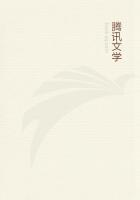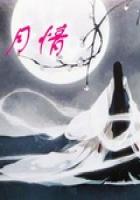But no laxity is ever, I think, to be found in her brief passages of landscape. "The keen, still cold of the morning was succeeded, later in the day, by a sharp breathing from the Russian wastes; the cold zone sighed over the temperate zone and froze it fast." "Not till the destroying angel of tempest had achieved his perfect work would he fold the wings whose waft was thunder, the tremor of whose plumes was storm." "The night is not calm: the equinox still struggles in its storms. The wild rains of the day are abated: the great single cloud disappears and rolls away from Heaven, not passing and leaving a sea all sapphire, but tossed buoyant before a continued, long-sounding, high-rushing moonlight tempest. . . No Endymion will watch for his goddess to-night: there are no flocks on the mountains." See, too, this ocean: "The sway of the whole Great Deep above a herd of whales rushing through the livid and liquid thunder down from the frozen zone." And this promise of the visionary Shirley: "I am to be walking by myself on deck, rather late of an August evening, watching and being watched by a full harvest moon: something is to rise white on the surface of the sea, over which that moon mounts silent, and hangs glorious. . . I think I hear it cry with an articulate voice. . . I show you an image fair as alabaster emerging from the dim wave."Charlotte Bronte knew well the experience of dreams. She seems to have undergone the inevitable dream of mourners--the human dream of the Labyrinth, shall I call it? the uncertain spiritual journey in search of the waiting and sequestered dead, which is the obscure subject of the "Eurydice" of Coventry Patmore's Odes. There is the lately dead, in exile, remote, betrayed, foreign, indifferent, sad, forsaken by some vague malice or neglect, sought by troubled love astray.
In Charlotte Bronte's page there is an autumnal and tempestuous dream. "A nameless experience that had the hue, the mien, the terror, the very tone of a visitation from eternity. . . Suffering brewed in temporal or calculable measure tastes not as this suffering tasted." Finally, is there any need to cite the passage of Jane Eyre that contains the avowal, the vigil in the garden?
Those are not words to be forgotten. Some tell you that a fine style will give you the memory of a scene and not of the recording words that are the author's means. And others again would have the phrase to be remembered foremost. Here, then, in Jane Eyre, are both memories equal. The night is perceived, the phrase is an experience; both have their place in the reader's irrevocable past.
"Custom intervened between me and what I naturally and inevitably loved." "Jane, do you hear that nightingale singing in the wood?""A waft of wind came sweeping down the laurel walk, and trembled through the boughs of the chestnut; it wandered away to an infinite distance. . . The nightingale's voice was then the only voice of the hour; in listening I again wept."Whereas Charlotte Bronte walked, with exultation and enterprise, upon the road of symbols, under the guidance of her own visiting genius, Emily seldom went out upon those far avenues. She was one who practised imagery sparingly. Her style had the key of an inner prose which seems to leave imagery behind in the way of approaches--the apparelled and arrayed approaches and ritual of literature--and so to go further and to be admitted among ****** realities and antitypes.
Charlotte Bronte also knew that ****** goal, but she loved her imagery. In the passage of Jane Eyre that tells of the return to Thornfield Hall, in ruins by fire, she bespeaks her reader's romantic attention to an image which in truth is not all golden.
She has moments, on the other hand, of pure narrative, whereof each word is such a key as I spoke of but now, and unlocks an inner and an inner plain door of spiritual realities. There is, perhaps, no author who, simply telling what happened, tells it with so great a significance: "Jane, did you hear that nightingale singing in the wood?" and "She made haste to leave us." But her characteristic calling is to images, those avenues and temples oracular, and to the vision of symbols.
You may hear the poet of great imagery praised as a great mystic.
Nevertheless, although a great mystical poet makes images, he does not do so in his greatest moments. He is a great mystic, because he has a full vision of the mystery of realities, not because he has a clear invention of similitudes.
Of many thousand kisses the poor last, and Now with his love, now in the colde grave are lines on the yonder side of imagery. So is this line also:
Sad with the promise of a different sun, and Piteous passion keen at having found, After exceeding ill, a little good.
Shakespeare, Chaucer and Patmore yield us these great examples.
Imagery is for the time when, as in these lines, the shock of feeling (which must needs pass, as the heart beats and pauses) is gone by:
Thy heart with dead winged innocence filled, Even as a nest with birds, After the old ones by the hawk are killed.
I cite these lines of Patmore's because of their imagery in a poem that without them would be insupportably close to spiritual facts;and because it seems to prove with what a yielding hand at play the poet of realities holds his symbols for a while. A great writer is both a major and a minor mystic, in the self-same poem; now suddenly close to his mystery (which is his greater moment) and anon ****** it mysterious with imagery (which is the moment of his most beautiful lines).
The student passes delighted through the several courts of poetry, from the outer to the inner, from riches to more imaginative riches, and from decoration to more complex decoration; and prepares himself for the greater opulence of the innermost chamber. But when he crosses the last threshold he finds this mid-most sanctuary to be a hypaethral temple, and in its custody and care a ****** earth and a space of sky.















